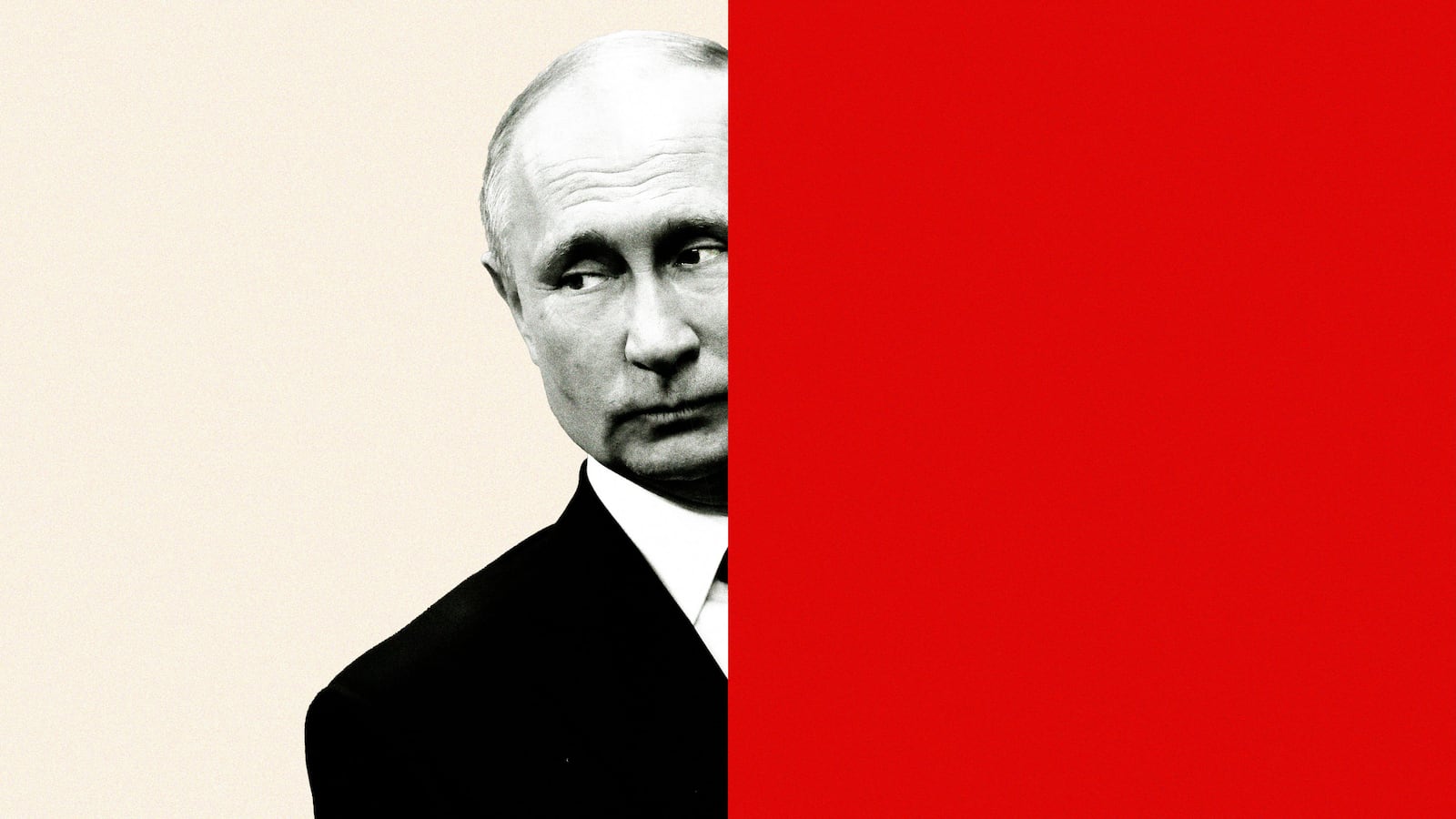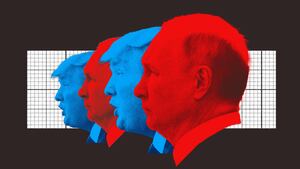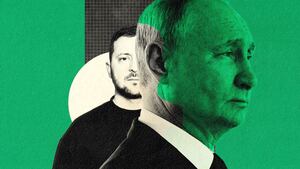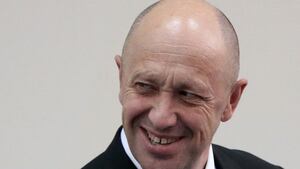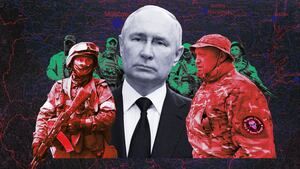Russia has known no other leader in the 21st century than Vladimir Putin. Throughout his nearly quarter-century in power, few global leaders have been so closely scrutinized. U.S. and allied intelligence agencies have observed and analyzed him more closely than perhaps any other single individual.
So how come we keep getting him and the nature of the threat he poses so wrong?
At first the mistakes we made about Putin could be written off to inexperience. In 2001, just a year after Putin had assumed power, George W. Bush famously said he was able to look Putin in the eye and “get a sense of his soul.” As a result of this spiritual journey, the American president concluded that the Russian leader was “very straightforward and trustworthy.”
Like Bush, successive American presidents were played by Putin, cowed by his use of force, seduced into thinking the power of their personalities or diplomacy could contain the threat he posed. As a result, Putin was able to repeatedly catch America flat-footed—in Georgia, in Syria, and in Ukraine. Our responses in each of these cases were too weak and then, under President Donald Trump, the U.S. had a president who went a step further and was seduced by Putin’s seeming strength.
In an insightful 2017 New York Times op-ed, Masha Gessen explored how Trump could fall under the spell of a leader as thuggish and demonstrably corrupt as Putin. They cited several factors that included “ignorance,” “a love of power and grandeur,” “shared prejudice,” “an inability or unwillingness to distinguish fact from fiction,” and “moral neutrality.” On this last point, Gessen was being kind.
The reality is that the Putin lovers were actively evil, admiring his brutality and, in Trump’s case, wishing he could exercise power in the same way.

President Donald Trump shakes hands with Russia's President Vladimir Putin during their bilateral meeting at the G20 summit in Hamburg, Germany on July 7, 2017.
Carlos Barria/ReutersAs recently as a week ago, former New Jersey Gov, Chris Christie cited Trump’s goon-envy, saying he the former president aspired to being “Putin in America.” It was hardly a stretch. Trump was on the record calling Putin’s invasion of Ukraine “genius,” and on numerous other occasions osculating the dictator’s hindquarters.
Perversely, it may be that Trump—in seeing Putin as a fellow gangster—may have better understood the essence of Putin than did Bush or Obama, who repeatedly acted as if somewhere within Putin were the impulses of a world-leader (albeit one who was both an adversary and serially violated international law).
It is fair to say that President Biden came to power with no illusions about Putin. He called Putin a dictator while he was still serving as Barack Obama’s vice president. And of course, once Putin invaded Ukraine, Biden offered the harshest condemnation of the Russian leader any U.S. president has ever expressed, accurately calling the former KGB officer a “war criminal” and even daring to suggest that Russia and the world would be better off without Putin in office.
What is more, of course, not only has Biden offered tough words about his Russian counterpart, he has also taken strong actions, leading the global coalition to support Ukraine in repelling Russia’s illegal and brutal invasion.
No president since Putin took office has had a clearer read on the Russian leader than Biden.
That said, for all the efforts and time spent trying to understand the Putin that Bush was searching for when he looked into his eyes, leaders in the U.S. and around the world have, apparently, continued to be surprised by Putin’s actions.
Prior to the invasion of Ukraine there was a prevailing view that Putin was a “master strategist.” One over-the-top assessment in The Jerusalem Post in 2017 called him “the most gifted leader in the international arena.” He has, for many years, been hailed for being smarter than U.S. leaders.

Russian service members march during a rehearsal for a military parade in the Red Square in Moscow, Russia on May 7, 2022.
Maxim Shemetov/ReutersHe was seen as having built up a great military, the world’s “second best.” For years, we touted it. Even weeks before the Russian escalation in Ukraine last year, The New York Times ran a story headlined, “Russia’s Military, Once Creaky, Is Modern and Lethal,” touting Putin’s impressive build up of his armed forces. “Under Mr. Putin’s leadership,” the article asserted, “(the Russian military) has been overhauled into a modern sophisticated army, able to deploy quickly and with lethal effect in conventional conflicts, military analysts said.”
Putin was also seen as an all-powerful and implacable man who could set and enforce red lines for the West—and who would never negotiate, and then, one by one, cross those red lines without consequence.
Then, suddenly and right before our eyes, the supposedly all-powerful Putin ended up cutting a deal with a rogue mercenary backed by a small force who nearly drove all the way to Moscow.
Apparently, he is not nearly as “in control” as we had thought he was just a few weeks ago.
As for Russia’s army (the one Putin actually controls), according to the chief of staff of the U.K.’s armed forces this week, half of its combat capability has been lost in the past year in its war with Ukraine. Clearly, a geopolitical genius Putin is not.
So, how after all this time can we still be getting Putin wrong?
Well, in addition to the reasons Gessen mentioned six years ago—which still prevail among Trump and his followers—there are a few additional ones.

Fighters of Wagner private mercenary group pull out of the headquarters of the Southern Military District to return to base, in the city of Rostov-on-Don, Russia, on June 24, 2023.
Alexander Ermochenko/ReutersFirst, there are important power centers in Washington and in capitals throughout the NATO alliance that have an interest in overstating Putin’s strength, the danger he poses, and the capabilities of his military.
They are, of course, defense contractors and military leaders who depend on formidable enemies to help them pass the massive defense budgets to which they have become addicted. They are, more often than not, abetted by journalists and analysts who seek access to them and, thus, who parrot their lines. (It also just so happens that they benefit when they write stories that are big on drama and ominous foreshadowing.)
That’s not to say that Putin is not dangerous or that an army that possesses the world’s largest nuclear stockpile is not a force to be reckoned with. It is and should be.
That said, it is past time to reassess the Russian threat. If Russia’s armies have fared so poorly against a small neighbor like Ukraine, it must be clear to them (and to all) that they would do disastrously were they to face the combined forces of NATO—by far the world’s most potent military alliance, and one that has gotten significantly stronger as a consequence of Putin’s Ukraine invasion.
In addition, as we have seen in recent weeks, even Russia’s ability to play the nuclear card has been limited by the fact that its most important ally, China, has pressured Moscow not to use weapons of mass destruction (WMDs) in Ukraine.

Ukrainian service members check a destroyed Russian a BMP-2 infantry fighting vehicle near the front line in the newly liberated village Storozheve in Donetsk region, Ukraine on June 14, 2023.
Oleksandr Ratushniak/ReutersIn fact, the China relationship that Putin undoubtedly saw as an empowering factor has been one that has actually limited him throughout the past year, offering words of support and limited aid but not stepping up and providing key weapons or other forms of support that could have strengthened Russia.
Indeed, it is clear now that Putin is not in a relationship of equals with China. He is, as the Biden administration has pointed out, the junior partner in the alliance and losing traction fast. Further, the support he expected from other allies has chilled a bit as Russia has faltered in Ukraine—and committed serial war crimes along the way.
These last points all do provide at least one partially exculpatory explanation for why so many have gotten Putin so wrong. The Vladimir Putin of 2023 is not the Vladimir Putin who assumed power in 2000 or even the one who boldly ignored international law when invading Georgia in 2008 or Ukraine in 2014. He is not even the Vladimir Putin of 2022, prior to the most recent attack on Ukraine.
He is, as we have seen, older, more paranoid and significantly diminished by the gross misalignment between his hubris and his abilities as a leader. He has not only suffered on the battlefield, but his country has suffered grievously from economic sanctions, all losses that will take decades to repair.

Russian President Vladimir Putin and Chinese President Xi Jinping attend a joint statement following their talks at the Kremlin in Moscow, Russia on March 21, 2023.
Mikhail Tereshchenko/Sputnik/Pool via ReutersIn other words, Putin, sitting at the end of his long tables or hiding in his bunker, on some level knows that it will be up to someone else to rebuild the Russia whose standing, economy, and military he has devastated.
None of this means Putin is not capable of inflicting damage. Daily headlines of horrors in Ukraine prove he is. Worrisome reports out of the Zaporizhia nuclear facility suggest unimaginable catastrophes are still possible, especially because he is desperate.
But the past year has been instructive for world leaders. Putin is not ten feet tall. The Russian military has been cut down to being a shadow of its former self. Fortunately, for the most part, threats of retaliation no longer intimidate an emboldened NATO.
Crucial lessons have been learned that all too often come too late with international bullies of Putin’s ilk. Such men (and throughout history these monsters have been mostly men) are always more deeply flawed than they appear. They inevitably sow the seeds of their own downfalls.
We do ourselves a disservice when we overstate their strengths and allow groups within our societies to amplify that overstatement to serve their own narrow interests.
Whereas rogue leaders like Putin feed off the weakness inculcated by their threatening tactics and postures, generating and maintaining the will to stand up to them is the one proven way to bring them down. The strength of Ukraine, of President Biden, of our NATO allies have finally revealed with great clarity the defects of Russia’s tinpot czar.
Let us hope we are able to maintain the strength we need to defeat him in Ukraine, and contain in a lasting way the threat he will pose as long as it takes for his waning power to disappear altogether.

